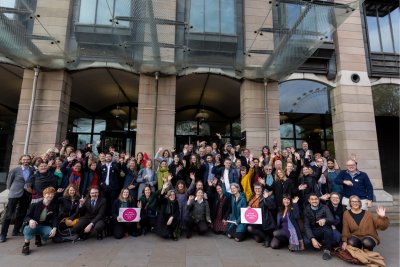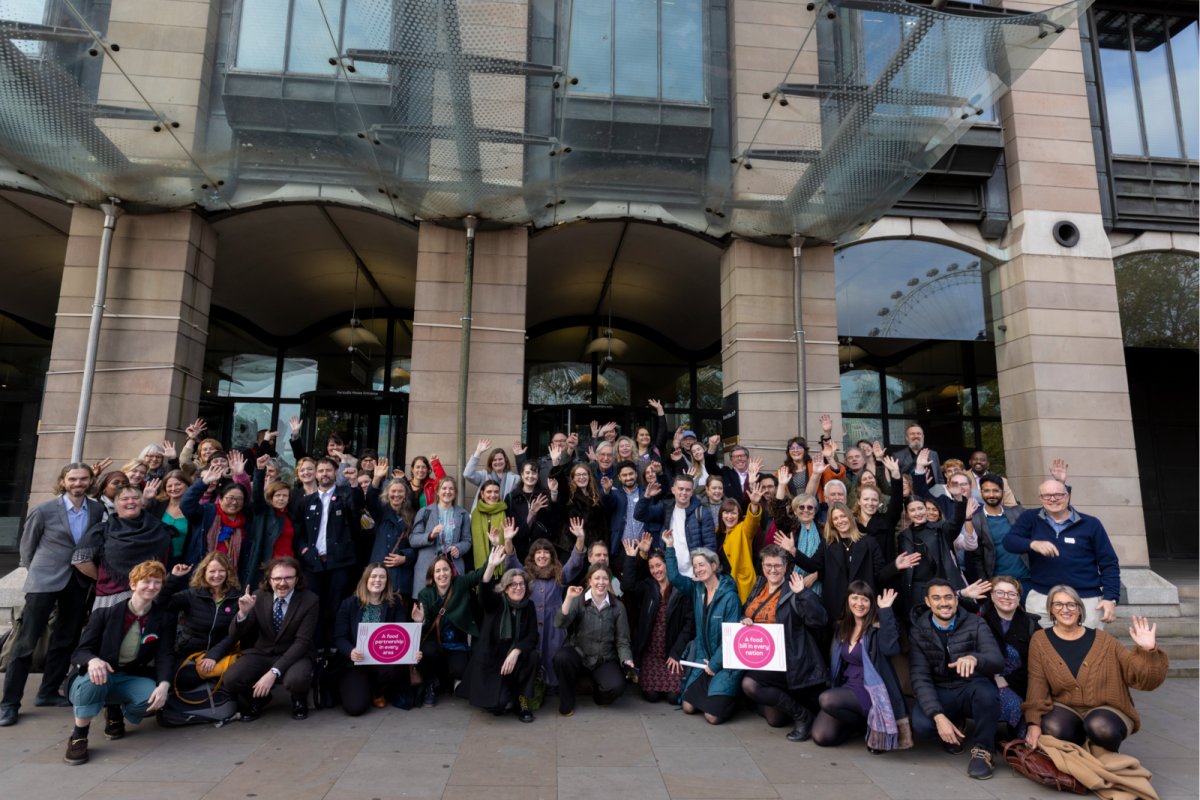 Sustainable Food Places at Portcullis House, Westminster. Credit: Jonathan Goldberg
Sustainable Food Places at Portcullis House, Westminster. Credit: Jonathan Goldberg

For a national Food Strategy, let local action lead the way
A new Food Strategy should mandate a strategic focus on food at all levels of government, with local food partnerships playing a critical part. Sustain's Vera Zakharov outlines why local place-based action is key to driving change and shares some of the recomendations from the SFP Food Strategy briefing.
This summer, the 123-member-strong, UK-wide Sustainable Food Places network (SFP) had the opportunity to engage the Defra Food Strategy development process, alongside other leading voices in food and farming, on what we need to see in an ambitious Food Strategy for the whole of the UK.
In its briefing to the Defra Food Strategy team, the SFP network highlights key policy levers to accelerate local, place-based action. The briefing calls for formal recognition of food partnerships in driving change, mandating a strategic focus on food at all levels of government, and specific policy levers that can accelerate local action to ensure everyone has access to a healthy, fair and sustainable diet.
Read the full briefing and key recommendations here.
Community-led work on improving access to good food is as old as the story of humanity. But in modern times, in the face of global crises including poverty, diet-related illness and climate and nature breakdown, a strategic focus on improving the way the whole food chain functions - and ensuring the most vulnerable and disadvantaged communities aren't further harmed by its disfunctions - has become ever more important.
This is where food partnerships and their EU/US counterpart food policy councils come in. From a handful of cities a decade ago, the UK Sustainable Food Places network now spans 123 local authorities across the four nations, from towns and boroughs to counties producing much of our food and Europe's biggest local authority, the city of Birmingham. Food partnerships were recognised for their central role in transforming food systems in the 2021 National Food Strategy. But with Defra's renewed effort to set a vision for improving health and public security, the economy and environment through a Food Strategy for the whole of the UK, it is critical that our network has a say in shaping its direction.
Local action at the heart of change
Place-based food policy and practice has national impact, and there is a wealth of evidence to show its power to transform local communities. It is both scalable and replicable to reach a tipping point for significant national impact. Some examples of the spread of local change on are:
- Health: councils and other local settings adopting healthier advertising policies. (see Cambridge and 22 other local authorities)
- Food security: community and council settings adopting cash-first, choice-based and dignity-led approaches to support food insecure households to access essentials. (see Lewes District and the Alliance for Dignified Food Support)
- Economic growth: Improving public sector food procurement to enable nature-friendly local producers to access contracts and grow their businesses. (See Carmarthenshire and Welsh Veg in Schools)
- Environmental sustainability: Supporting green growth via enabling diverse horticultural enterprises to access land and supply fresh, sustainable produce directly to local communities. (See Dumfries & Galloway and Carrickfergus Greengrocers)
Local, place-based food system change is powerful, but it can only go so far without supportive national policy and investment. To truly transform the UK’s food system, local ambition must be matched by enabling national policy and national leadership sets the direction, creates consistency, and unlocks resources to scale local efforts.
Devolved nations show the way
It is important to recognise devolved nations' leadership on food. Many powers relating to food and farming have been devolved in Northern Ireland, Scotland and Wales. The Wellbeing of Future Generations (Wales) Act 2015 and the recently published Community Food Strategy aims to strengthen local food systems including support for Welsh food partnerships. The Good Food Nation (Scotland) Act 2022 places a statutory duty on the Scottish Government, Local Authorities and Health Boards to each produce cross-cutting, systems-led Food Plans. And the Northern Ireland Food Strategy Framework sets the long-term direction and presents a new whole of government approach around food.
However, action in an English context - championed by the Food Strategy - will strengthen related action at devolved nations’ levels and signal a more unified direction of change, while supporting devolved nations to build on their progress.
Policy at all levels
While devolved nations leadership plays a central role in transforming the food system, leadership at an English regional and devolved level is minimal, with Greater London's work a notable exception. Our briefing calls for the mandating of a strategic focus on food at a combined and mayoral level. This will offer a once in a generation opportunity to embed food systems transformation in the devolution of decisions and resources to a more local level. It can empower regional leaders to influence food systems at the scale of supply chains, movement of people to work, study, and partake in leisure activities, and the scale of regional and cultural identities - the scales of everyday life.
So too local councils, from London boroughs to unitary and other strategic authorities, should be empowered to transform food policy and practice in their remit, and realise the vision on equity of access to healthy, sustainable food held by many elected representatives and council leaders. Sustain's Good Food Local programme provides a platform for councils to audit and benchmark their leadership on all aspects of food, and complements the Sustainable Food Places programme to align action across public, community and enterprise sectors. Many councils are showing their commitment to food across all policies, and we want to see this as the standard.
Recommendations for the Food Strategy
Our briefing identifies policy recommendations at a UK-wide level including those to do with food governance, alongside those principally in an English context, framed along the four key pillars of the Food Strategy. Here is just a sample of what we're calling for.
Back an Essentials Guarantee ensuring that Universal Credit
protects people from going without essentials such as nourishing food and
heating, allowing a transition away from a reliance on charitable food aid and food banks to meet everyday food needs.
Mandate restrictions on junk food advertising in the media and online, with adequate powers for enforcement by Ofcom and ASA, ending the junk food cycle and its associated costs to the NHS, communities and local authorities.
Mandate the development of local or regional food strategies in every authority across the UK, supported by national frameworks that allow for place-based tailoring, and driven by well-resourced food partnerships enabling diverse and representative input across communities.
Mandate the inclusion of food insecurity and food system resilience into national and local risk planning processes, including Local Authority risk registers, Local Resilience Forum (LRF) and Emergency Preparedness Group (EPG) structures.
Enable auto-enrolment for the Healthy Start/Best Start Schemes and Free School Meals, including for children in families on low incomes with no recourse to public funds, removing barriers to accessing vital children’s nutritional safety nets.
Provide targeted investment and support to food SMEs and social businesses, building on the Local Food Growth Plan, including start-up support, infrastructure, training, scaling and digital-enabled efficiency, in order to to boost the ‘green growth’ of supply of healthy, sustainable, and locally produced food and build community wealth.
Deliver the government’s commitment on public food procurement to guarantee that 50% of public sector food is local and sustainable as well as ensuring meals reflect the Eatwell Guide, cultural needs and diverse preferences. Enable local authorities to facilitate local and sustainable producers to access contracts and work with catering teams to handle seasonal produce, and to reformulate recipes.
Read our full briefing and key recommendations
Over to Defra
We call on the national Food Strategy to champion place-based approaches to food systems transformation and call for a UK food system where food partnerships are critical infrastructure, enabling communities to thrive and sustainable economies to grow - ensuring that everyone has equitable access to healthy, fair and sustainably-produced food.
Sustainable Food Places: Network bringing together over 100 local food partnerships.
Sustain
The Green House
244-254 Cambridge Heath Road
London E2 9DA
020 3559 6777
sustain@sustainweb.org
Sustain advocates food and agriculture policies and practices that enhance the health and welfare of people and animals, improve the working and living environment, promote equity and enrich society and culture.
© Sustain 2026
Registered charity (no. 1018643)
Data privacy & cookies
Icons by Icons8







